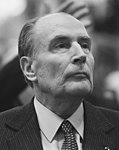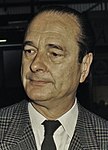Our website is made possible by displaying online advertisements to our visitors.
Please consider supporting us by disabling your ad blocker.
1988 French presidential election
| ||||||||||||||||
| Turnout | 81.38% (first round) 84.06% (second round) | |||||||||||||||
|---|---|---|---|---|---|---|---|---|---|---|---|---|---|---|---|---|
| ||||||||||||||||
| ||||||||||||||||
Presidential elections were held in France on 24 April and 8 May 1988.
In 1981, the Socialist Party leader, François Mitterrand, was elected President of France and the Left won the legislative election. However, in 1986, the right regained a parliamentary majority. President Mitterrand was forced to "cohabit" with a conservative cabinet led by the RPR leader Jacques Chirac. Chirac took responsibility for domestic policy while the President focused on his "reserved domain" – foreign affairs and defense policy. Moreover, several other prominent candidates opposed the two heads of the executive.
Chirac's cabinet advocated liberal-conservative policies, in abolishing the solidarity tax on wealth and selling some public companies. It was faced with opposition from social movements, supported by President Mitterrand.
Meanwhile, the leadership of Chirac over the right was challenged by the former UDF Prime Minister Raymond Barre. Barre gained some popularity by condemning the principle of the "cohabitation", claiming that it is incompatible with the "spirit of the Fifth Republic". He appeared as an alternative to the executive duo. In January 1988, when he announced his candidacy, Chirac was credited with 19.5% in the first round by SOFRES polls institute, against 23% for Barre. But, from the start of February, Chirac benefited from the internal divisions in the UDF, and took the lead among the right-wing candidates. Meanwhile, the National Front leader, Jean-Marie Le Pen, tried to confirm the FN's good result in the previous legislative election.
On the left, the identity of the Socialist candidate was uncertain. Mitterrand said he was not sure he would run, and meanwhile, his internal rival Michel Rocard campaigned for the nomination. The favourite to win the election according to the polls, the incumbent president announced his candidacy at the end of March. He wrote an open letter to the French, where he proposed a moderate programme ("neither nationalisations, nor privatizations") and advocated a "united France" against "the appropriation of the state by a clan", targeting Chirac and the RPR.
He benefited from the decline of the French Communist Party, represented by André Lajoinie. Lajoinie was faced with competition for the far-left vote by a "reforming Communist", Pierre Juquin and a Trotskyist, Arlette Laguiller. Meanwhile, the Ecologist Antoine Waechter refused to ally the Greens with either the left or the right.
The French economy shrugging off the early 1980s recession with 4% growth that year put the economy off the minds of voters as well as popular social programs being implemented, both of which gave Mitterrand the economic argument to achieve a second term despite the fallback in the last legislative election that caused cohabitation.
Previous Page Next Page
انتخابات الرئاسة الفرنسية 1988 Arabic Eleccions presidencials franceses de 1988 Catalan Præsidentvalget i Frankrig 1988 Danish Präsidentschaftswahl in Frankreich 1988 German Elecciones presidenciales de Francia de 1988 Spanish 1988ko Frantziako Hauteskunde Presidentzialak EU Ranskan presidentinvaali 1988 Finnish Élection présidentielle française de 1988 French הבחירות לנשיאות צרפת 1988 HE Elezioni presidenziali in Francia del 1988 Italian






